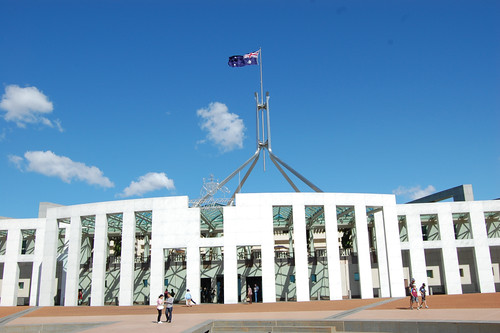A part of my job, I look at regulatory issues quite a bit from a financial services standpoint, and understand that regulators, mandated by governments, need to keep certain "free market" businesses in check in the interests of the customer in the longer term. (See discussion of the new Basel Accord changes on
www.systemiclogic.com.au soon).
Recentely, however, I was struck by the logic behind the regulation of another industry - the international airlines. Long gone are the days (in most countries) where the country's flag carrying airline had the local business to itself and was actively protected from competition on routes to and from its home country - the industry has seen deregulation, resulting in fares which make flying the cheapest form on travel in most cases. However international routes are still the subject of regulation by regulators of each of the countries which the route aims to connect. Whilst safety is the overriding concern behind the licensing of airlines, customer conevience (frequency of routes, availability) and price are purported to be the prime reasons behind the regulatory approvals of routes and the airlines who want to fly them. "Purported", because from the recent events I have to conclude that the customer convenience cannot be the only factor driving the regualtor decisions.
Example 1:
Eighteen months ago, a second Australia registered carrier (Virgin, flying as V Australia) started flying the route between Australia and the US. Regulatory approval was obtained for both Virgin, and Delta, the second US carrier wanting to operate the route - this was in the interests of the passenger, as it would provide more competition to the two incument airlines, Qantas and United. A year later Virgin and Delta applied for permission to "legally collude", or, as it's euphemistically put, cooperate on the route. The regulator in Australia approved the collusion, whereas the regulator in the US denied this. This is the first inconsistency, since the interests of the customer should be the same, so why are the regulators providing inconsistent decisions? Perhaps there is a national interest issue as well, and the Australian regulator was trying to protect Australia's second airline from further US competition? Anyway: strike one against Virgin.
Example 2:
Trans-Tasman route is predominantly operated by Qantas, Air New Zealand and Virgin. Emirates also extends some of its flights to Australia to fly onto New Zealand, however its role on this route is secondary. Virgin and Air New Zealand applied to collude on the route, and this was denied by the Australian regulator: strike two against Virgin.
Example 3:
Virgin started flying to Johannesburg in South Africa in March of this year. These flights originated in Melbourne, but were nontheless competition to Qantas, whose flights to Johannesburg originate in Sydney, and South Africa's carrier which flies from Perth. Interestingly Qantas and SA legally collude on these routes and sell seats on each others' aircraft, so from a fare point of view, Qantas offer flights from Sydney and Perth. Virgin had some impact on the route pricing, since they launched fares which were lower than the incumbents, however it is interesting to note that fares to Johannesburg are still at least 30% dearer than those to Los Angeles (comparable distance flown, MEL-JNB: $1480, MEL-LAX: $1149), now there is probably an economy of scale which contributes somewhat to this differential, but interesting stat nonetheless. More interesting though is that earlier this year when the Qantas / SA collusion came up for review, the Australian regualor ruled to renew it for a further period: strike three against Virgin, but also, in my view to the detriment of lower fares on the route, and therefore the customer. Eventhough Qantas, in its representation in lobbying for the extension of the collusion with SA, referred to Virgin as the new formidable competitor on the route, it was but a few months later that Virgin announced its withdrawal from the route citing profitability issues. In fact it must have been their load factors which were abysmal, with fares 30% higher than other similar routes, it should have been profitable.
Now the regulatory deicisions cited in the first two examples caused some ire in the Virgin group, causing Branson to "bleat" that its unfair! (No sympathy from me on that front). However taking the third example into the mix as well, one has to wonder when looking at these from the other perspective:
Example 1 - ruling in favour of Qantas
Example 2 - ruling in favour of Qantas
Example 3 - ruling in favour of Qantas - Excuse me for being a bit sceptical and at least suspecting that there might be a slight possibility of conspiracy in favour of one of Australia's national icons - but where does that leave the customer!?
In the interests of transparency, I have to declare that: 1) my interest in the airline idustry is purely as a layman, and I don't have any professional interest or expertise in evaluating them, or their regulation; 2) I have a reputation of supporting the underdog in sport and business, and typically do not like fat and happy incumbent businesses; 3) I fly between Melbourne and Johannesburg at least twice a year, and enjoyed the extra competition, and the direct nature of Virgin's route while it lasted, and was filthy when they decided to withdraw it!



